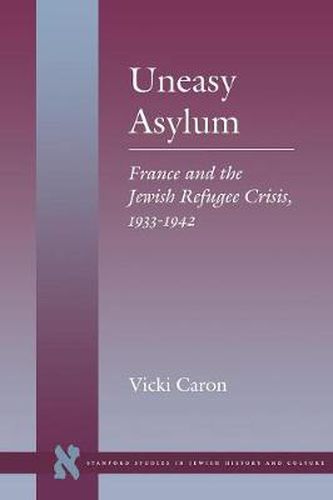Readings Newsletter
Become a Readings Member to make your shopping experience even easier.
Sign in or sign up for free!
You’re not far away from qualifying for FREE standard shipping within Australia
You’ve qualified for FREE standard shipping within Australia
The cart is loading…






This book, which draws on a rich array of primary sources and archival materials, offers the first major appraisal of French responses to the Jewish refugee crisis after the Nazi seizure of power in 1933. It explores French policies and attitudes toward Jewish refugees from three interrelated vantage points: government policy, public opinion, and the role of the French Jewish community. The author demonstrates that Jewish refugees in France were not treated in the same manner as other foreigners, in part because of foreign policy considerations and in part because Jewish refugees had a distinctive socioeconomic profile. By examining the socioeconomic and political factors that informed French refugee policy in the 1930’s, the author presents overwhelming evidence that Vichy’s anti-Jewish measures were not merely the work of a few antisemitic zealots in the administration, nor did they stem solely from the desire of Marshal PZtain’s government to find scapegoats for the military defeat of 1940. Rather, they enjoyed widespread popular support, not only from far-right organizations but also from a host of middle-class professional associations and their members (doctors, lawyers, merchants, and artisans) who perceived Jews as a competitive threat.
$9.00 standard shipping within Australia
FREE standard shipping within Australia for orders over $100.00
Express & International shipping calculated at checkout
Stock availability can be subject to change without notice. We recommend calling the shop or contacting our online team to check availability of low stock items. Please see our Shopping Online page for more details.
This book, which draws on a rich array of primary sources and archival materials, offers the first major appraisal of French responses to the Jewish refugee crisis after the Nazi seizure of power in 1933. It explores French policies and attitudes toward Jewish refugees from three interrelated vantage points: government policy, public opinion, and the role of the French Jewish community. The author demonstrates that Jewish refugees in France were not treated in the same manner as other foreigners, in part because of foreign policy considerations and in part because Jewish refugees had a distinctive socioeconomic profile. By examining the socioeconomic and political factors that informed French refugee policy in the 1930’s, the author presents overwhelming evidence that Vichy’s anti-Jewish measures were not merely the work of a few antisemitic zealots in the administration, nor did they stem solely from the desire of Marshal PZtain’s government to find scapegoats for the military defeat of 1940. Rather, they enjoyed widespread popular support, not only from far-right organizations but also from a host of middle-class professional associations and their members (doctors, lawyers, merchants, and artisans) who perceived Jews as a competitive threat.